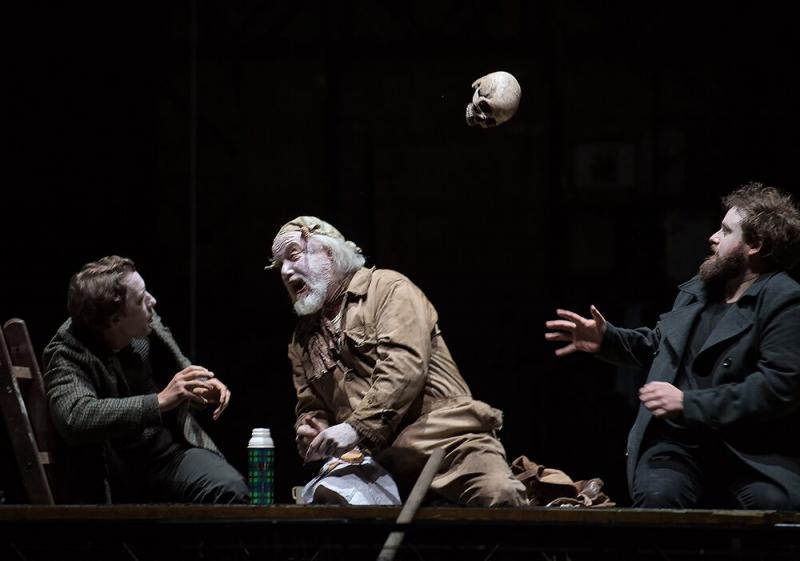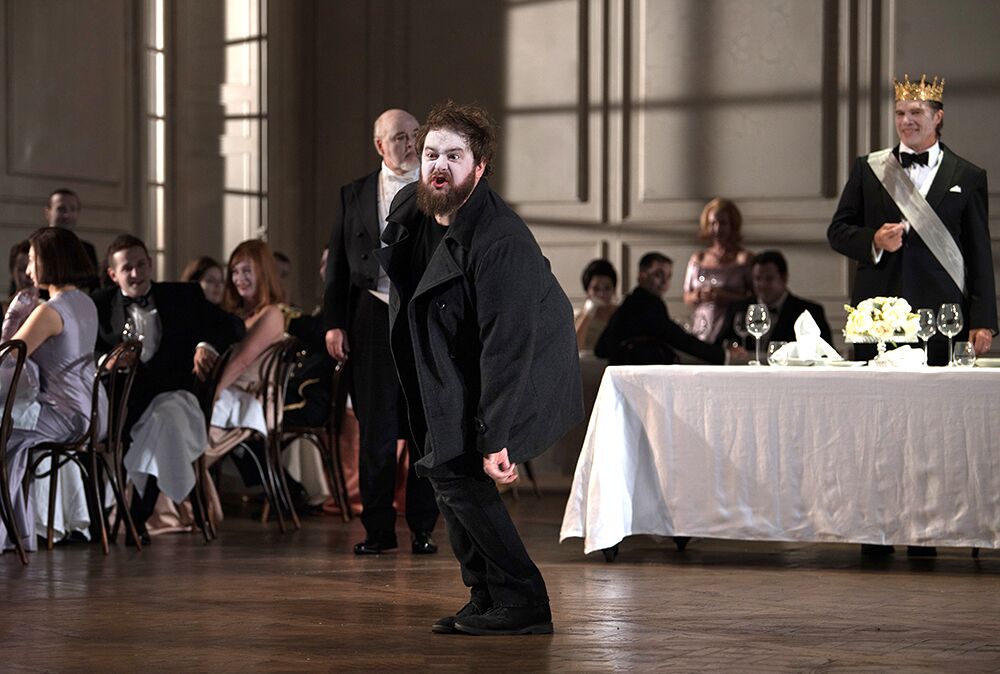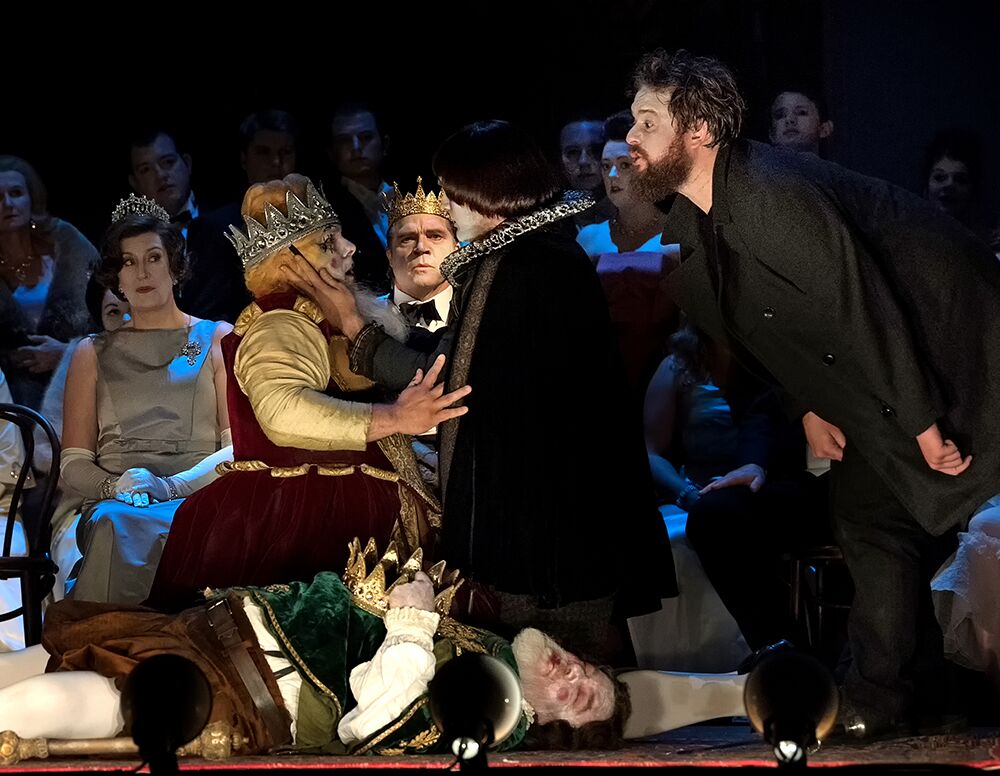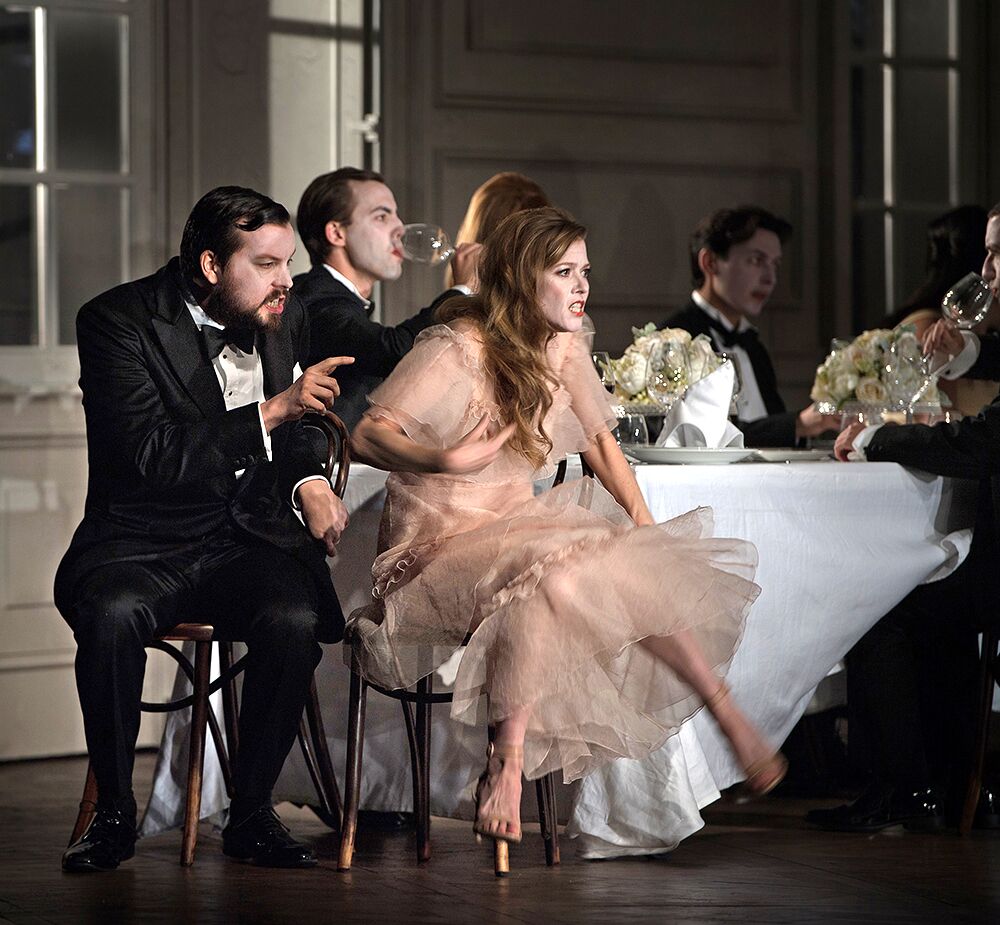Hamlet, Glyndebourne review - integrity if not genius in Brett Dean's score | reviews, news & interviews
Hamlet, Glyndebourne review - integrity if not genius in Brett Dean's score
Hamlet, Glyndebourne review - integrity if not genius in Brett Dean's score
Total work of art status for this labour of love on a fascinating but flawed new opera

Nature’s germens tumble all together rather readily in more recent operatic Shakespeare. Following the overblown storm before the storm of Reimann’s Lear and the premature angst of Ryan Wigglesworth’s The Winter’s Tale, what's rotten in the state of Denmark rushes to the surface a little too quickly in Brett Dean's bold new take on the most challenging of all the tragedies.
There is total integrity, but not genius. For that, perhaps, a more daring paraphrase of Hamlet’s gist would have been necessary. Imagine, for instance, what a filleted Gerald Barry treatment might have made of the existential absurdities (a wacky Soviet production of the 1930s with music by the young Shostakovich suggests a fascinating precedent). Instead, despite the opening “…or not to be” putting the spotlight immediately on Allan Clayton’s charismatic protagonist (pictured below with Kim Begley's Polonius and Rod Gilfry's Claudius), Matthew Jocelyn’s skilful libretto stays faithful to the flabbergasting text and the drama’s trajectory. Sometimes characters purloin others’ lines; there is a metaphysical chorus, and short ensembles, from trios to sextets, that are perhaps the least successful aspect of the writing in their amorphousness.

Some of the departures rob us of crucial aspects in the original drama: Hamlet’s father’s ghost sings at the heart-in-mouth moment where the son loses his mother’s belief in his revelation, and Rosencrantz and Guildenstern – countertenors Rupert Enticknap and Christopher Lowrey, brilliant – never leave with Hamlet for England, but instead live on to parrot Osric before and during the fatal fencing match. If you’re going to outline all the main events, the sombre break in time outlined by the Prince’s absence seems to me essential.
No point, though, in lamenting what’s not there. What is could have been the more vivid if Dean’s setting of the text were more speech-melodic. Despite Clayton’s superb articulation, much of the human music in the soliloquies is lost; for all the whistling strangeness that accompanies the Yorick monologue, its deeper pathos – still reverberating with me from Andrew Scott’s astounding delivery in the recent Almeida production – is lacking. What comes across as strongest in the vocal writing is Claudius’s attempt to pray for his sins, mesmerisingly delivered by Rod Gilfry (though it was surely a mistake to omit his final “My words fly up, my thoughts remain below,” the ironic twist to Hamlet’s scruples in not killing his father’s usurper in his orisons). The ensuing scene with Gertrude might have been musically stronger, too, but Sarah Connolly’s magnificent presence and urgency make it work almost as well as in the play.

The real soul is in the orchestra, even if its busy-ness doesn’t always seem closely related to action or thoughts. The pair of clarinets we first hear writhing in a twitchy court scene are phantasmagorical throughout; though the tuba and bass lines for the Ghost are overdone, they serve an impressive purpose. The introduction of an accordion, the wielder of which (the terrific James Crabb) comes onstage with the players (The Murder of Gonzago pictured above, with Sarah Connolly's Gertrude and Rod Gilfry's Claudius looking on), adds a crucial variety to the textures; the auditorium ensembles above left and right make this a work you have to experience in the theatre, especially in the antiphonal side drum rattles. The eight choral voices in the pit add an extra supernatural dimension, too.
There are new sonorities after the interval, chiefly in Ophelia’s mad scene – which you may see as gripping music theatre, or Barbara Hannigan doing her usual however superbly (pictured below in an early scene with David Butt Philip's Laertes) – and the encounter with the gravedigger. The indomitable John Tomlinson trebles up as this skull-tosser, Player 1 and Ghost, as in some productions of the play. He makes the most of settings which could be sharper; Jacques Imbrailo as Horatio and Butt Philip’s Laertes have fewer chances, though their presence is undeniable, and it will be fascinating to see what the other young tenor makes of Hamlet on the tour.

Armfield, a director of whom we haven’t seen enough in the UK recently, knows exactly how to operate the drama and move the characters around. He does so without mannerism and making full use of Ralph Myers’ malleable set – contrasting open windows with closed shutters, handsome rooms and backstage scenes, so evocatively lit by Jon Clark, and handsomely filled with Alice Babidge’s stylish costumes. The set pieces all work, The Murder of Gonzago in cahoots with the music’s brilliant jolts and pauses, the fencing finale in spite of the fact that here the score doesn’t really build the tension keenly enough.
Whether the whole moves you or not – I remained on the outside, though always fascinated – the total work of art cries out to be seen and heard. That’s especially due to the return of Jurowski, the house’s inspirational music director from 2001 to 2013, whose typically meticulous work not just with his magnificent London Philharmonic but also with the singers – he spent a whole day before the premiere making sure the covers were in a state of readiness to go on if necessary – and whose presence at every stage of the production can’t be praised too highly. Every composer needs a conductor like this to realise the ideal.
- Hamlet at Glyndebourne until 6 July, then on tour in the autumn.
- Livescreening available to watch for free on Glyndebourne website until 11.59pm on Thursday 13 July
- More opera reviews on theartsdesk
rating
Explore topics
Share this article
Add comment
The future of Arts Journalism
You can stop theartsdesk.com closing!
We urgently need financing to survive. Our fundraising drive has thus far raised £49,000 but we need to reach £100,000 or we will be forced to close. Please contribute here: https://gofund.me/c3f6033d
And if you can forward this information to anyone who might assist, we’d be grateful.

Subscribe to theartsdesk.com
Thank you for continuing to read our work on theartsdesk.com. For unlimited access to every article in its entirety, including our archive of more than 15,000 pieces, we're asking for £5 per month or £40 per year. We feel it's a very good deal, and hope you do too.
To take a subscription now simply click here.
And if you're looking for that extra gift for a friend or family member, why not treat them to a theartsdesk.com gift subscription?
more Opera
 Buxton International Festival 2025 review - a lavish offering of smaller-scale work
Allison Cook stands out in a fascinating integrated double bill of Bernstein and Poulenc
Buxton International Festival 2025 review - a lavish offering of smaller-scale work
Allison Cook stands out in a fascinating integrated double bill of Bernstein and Poulenc
 Tosca, Clonter Opera review - beauty and integrity in miniature
Happy surprises and a convincing interpretation of Puccini for today
Tosca, Clonter Opera review - beauty and integrity in miniature
Happy surprises and a convincing interpretation of Puccini for today
 Hamlet, Buxton International Festival review - how to re-imagine re-imagined Shakespeare
Music comes first in very 19th century, very Romantic, very French operatic creation
Hamlet, Buxton International Festival review - how to re-imagine re-imagined Shakespeare
Music comes first in very 19th century, very Romantic, very French operatic creation
 Falstaff, Glyndebourne review - knockabout and nostalgia in postwar Windsor
A fat knight to remember, and snappy stagecraft, overcome some tedious waits
Falstaff, Glyndebourne review - knockabout and nostalgia in postwar Windsor
A fat knight to remember, and snappy stagecraft, overcome some tedious waits
 Salome, LSO, Pappano, Barbican review - a partnership in a million
Asmik Grigorian is vocal perfection in league with a great conductor and orchestra
Salome, LSO, Pappano, Barbican review - a partnership in a million
Asmik Grigorian is vocal perfection in league with a great conductor and orchestra
 Semele, Royal Opera review - unholy smoke
Style comes and goes in a justifiably dark treatment of Handelian myth
Semele, Royal Opera review - unholy smoke
Style comes and goes in a justifiably dark treatment of Handelian myth
 Le nozze di Figaro, Glyndebourne review - perceptive humanity in period setting
Mostly glorious cast, sharp ideas, fussy conducting
Le nozze di Figaro, Glyndebourne review - perceptive humanity in period setting
Mostly glorious cast, sharp ideas, fussy conducting
 Fidelio, Garsington Opera review - a battle of sunshine and shadows
Intimacy yields to spectacle as Beethoven's light of freedom triumphs
Fidelio, Garsington Opera review - a battle of sunshine and shadows
Intimacy yields to spectacle as Beethoven's light of freedom triumphs
 Dangerous Matter, RNCM, Manchester review - opera meets science in an 18th century tale
Big doses of history and didaction are injected into 50 minutes of music theatre
Dangerous Matter, RNCM, Manchester review - opera meets science in an 18th century tale
Big doses of history and didaction are injected into 50 minutes of music theatre
 Mazeppa, Grange Park Opera review - a gripping reassessment
Unbalanced drama with a powerful core, uninhibitedly staged
Mazeppa, Grange Park Opera review - a gripping reassessment
Unbalanced drama with a powerful core, uninhibitedly staged
 Saul, Glyndebourne review - playful, visually ravishing descent into darkness
Ten years after it first opened Barrie Kosky's production still packs a hefty punch
Saul, Glyndebourne review - playful, visually ravishing descent into darkness
Ten years after it first opened Barrie Kosky's production still packs a hefty punch
 Così fan tutte, Nevill Holt Festival/Opera North review - re-writing the script
Real feeling turns the tables on stage artifice in Mozart that charms, and moves
Così fan tutte, Nevill Holt Festival/Opera North review - re-writing the script
Real feeling turns the tables on stage artifice in Mozart that charms, and moves

Comments
It cries out to be seen and
A different perspective,
A different perspective, obviously. And most audience members only get a chance to see an opera once - if they're gripped they will want to return (I think I could face seeing this again on the tour).
It might be worth clarifying a point about comparison with the play - I think I implied that if the opera made more of an impact as a thing apart from the Shakespeare play, comparisons would be less intense. Another spectator made the good point that if this weren't the gripping subject of Hamlet, would we approve the music as much? Still, it did at least bear the said comparison.
It seems the other spectator
The other imponderable. of
The other imponderable. of course, is how a new opera works on the imagination in the long term. Though I think I might still find shortcomings in the vocal writing, I'm sure this will stay in my mind and maybe evolve there when other more immediately emotional experiences have disappeared. Having to jump to a verdict first thing the morning after is not always ideal.
I do find it difficult to
I did wonder where this
This is absolute rubbish.